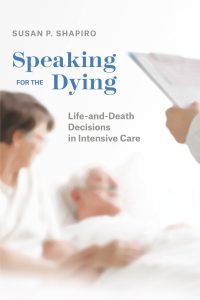The most significant “life-and-death” decisions of our lives – literally – are overwhelmingly made by others who act on our behalf when we are not competent to make our own medical decisions. This grant supports an observational study of our brothers’ keepers, as families, significant others, friends, and guardians interact with health care providers, day after day, in two demographically diverse intensive care units in a large urban teaching hospital.
From daily rounds with the critical care team, observations of interactions and meetings between medical staff and patient families and friends throughout the day, and medical records, I have gathered systematic data on patient medical histories, the medical issues and decisions they currently face, the interventions made on their behalf, the disposition of their hospital stay, their advance directives (if any), demographic characteristics of patients and other participants in decision making, and records of all meetings and conversations with their representatives regarding their medical care. More central to the research, though, are the rich ethnographic data from observed interactions that reflect:
- Who speaks for patients? How do spokespersons take on this role?
- How involved are patient families, friends, and other representatives? How much time do they spend at the hospital? Do they seek out physicians for updates and conversations? Do they ask questions? Do they try to micro-manage treatment?
- What process do surrogate decision makers and other representatives of patients follow in processing information and making decisions?
- How do physicians present and frame medical and prognostic information?
- How do patient representatives talk about, ask about, and comprehend medical information?
- How do conversations about goals of care arise (at the initiative of physicians, families, nurses, etc.)?
- How do physicians frame conversations and influence decisions about goals of care?
- Do families ask for or do physicians offer unsolicited advice?
- What criteria do decision makers invoke in making decisions (e.g., patient’s expressed wishes, perceived wishes, best interest, quality of life, the preferences of the decision maker, financial considerations, etc.)?
- What stories, memories, conversations, or descriptions of the patient are shared to formulate, explain, or justify decisions?
- Over what issues do members of the patient’s social network experience conflict? How often and in what circumstances does this occur?
- Over what issues do health care staff and representatives of patients conflict? How often and under what circumstances does this occur?
- How are conflicts resolved?
- What role does the hospital ethics committee play in these decisions?
- Where does one see and what is the role of emotion – sadness, despair, anger, frustration, denial, guilt, suspicion, etc.?
- Where does one see and what is the role of references to religion, God, and spirituality in how decisions are made?
- How often and in what ways does the cost of medical treatment and insurance figure in conversations about treatment and goals of care?
- What is the role of law at the bedside?
- Who has advance directives? What do they stipulate? How are they invoked and what role do they play in medical decision making? What is the impact, if any, of advance directives on who speaks and how decisions are made?
- How do health care staff use, consult, defer to, enforce, ignore, or misunderstand advance directives?
- Do physicians cite, understand, or comply with legal requirements concerning surrogate medical decision making?
- What role do private or hospital lawyers play in end-of-life decision making?
In the two ICUs, I have collected data on more than a thousand encounters and family meetings between almost 300 health care providers and more than 600 friends, family, and significant others of 205 patients without decision-making capacity.
Research for this project concluded with the capstone book project, Speaking for the Dying.


